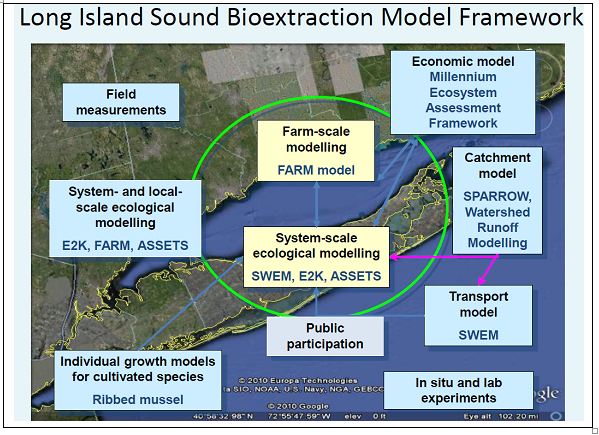NOAA Ocean Science Blog sat down with Dr. Suzanne Bricker of NOAA'sNational Centers for Coastal Ocean Science(NCCOS),Center for Coastal Monitoring and Assessment(CCMA), Coastal Ocean Assessments, Status, and Trends, to talk about her research to leverage aquaculture as a potential means for mitigating nutrient impacts on Long Island Sound.
Thank you for sitting down with us, Dr. Bricker.
Its great to be here.
How did the project come into existence?
The Long Island Sound Study'sEPARegional Ecosystem Services Program is re-evaluating the region's Total Maximum Daily Load (TMDL) and Nutrient Trading Programs (TMDL/Nutrient Trading Program), and is trying to determine if aquaculture farmers should be included into that program. The goal of this study is to evaluate the significance of nutrient removal by shellfish aquaculture in Long Island Sound, and also Great Bay, NH since EPA region 1 is also involved in the program.
Who are the partners in this project? What roles do they play?
This project is being undertaken across a broad variety of partners from the federal, state, private sector, and non-profit sectors. NOAA'sNational Centers for Coastal Ocean Science (NCCOS),Longline Environment, Ltd.,Shellfish Environment Services, andHydroQualInc., will be leading project design, execution, and application of theFARM andSWEMmodels. The economic modeling phase will be led by Northern Economics, Inc., and Shellfish Environment Services. Finally, the collection and sharing of data will be led by theNOAA National Marine Fisheries Service's Northeast Fisheries Science Center, the EPA Long Island Sound Office, and New Hampshire's Department of Environmental Services.
What is the project design?
This diagram shows the project design better than I could describe, it is a modeling exercise informed by experimental research results and other experts. This was part of a presentation,'Shellfish aquaculture and eutrophication reduction in Long Island Sound,' presented at the National Shellfish Association in Baltimore on March 30, 2011 in a session called,' Carrying Capacity, Modeling, Ecosystem services.'

The Farm Model applied to Long Island Sound.
What are the economic benefits that are possible through this project?
Aquaculture farmers may be able increase their income, and the number of aquaculture jobs in the region may potentially increase from money that would otherwise be paid forwaste-watertreatment. Another economic benefit is that there may potentially be more aquaculture facilities, therefore increasing the amount of shellfish available for consumption within the state as well as supporting potential inter-state commerce.
What are the larger implications/ benefits of this project?
One of the objectives of this research project is to assess the potential to use shellfish aquaculture as a nutrient management measure that is complementary to traditional management measures. This approach is designed to be applicable, with minor adjustments, to other water bodies such that the significance of shellfish aquaculture can be evaluated and put into operation. This could be another option for states looking to decrease nutrient runoff to their bays and increasing coastal economies through aquaculture.
Suzanne Bricker is a physical scientist with NCCOSand manager of NOAA'sNational Estuarine Eutrophication Assessment (NEEA). Her main responsibilities include research on nutrient-related water quality problems in coastal areas and finding solutions for these challenges. She was the lead scientist for theU.S. NEEA study,which provided an integrated framework for eutrophication assessment, and carried out a comprehensive overview of 138 estuaries in the U.S.
 Official websites use .gov
A .gov website belongs to an official government organization in the United States.
Official websites use .gov
A .gov website belongs to an official government organization in the United States. Secure .gov websites use HTTPS
A lock or https:// means you’ve safely connected to the .gov website. Share sensitive information only on official, secure websites.
Secure .gov websites use HTTPS
A lock or https:// means you’ve safely connected to the .gov website. Share sensitive information only on official, secure websites.